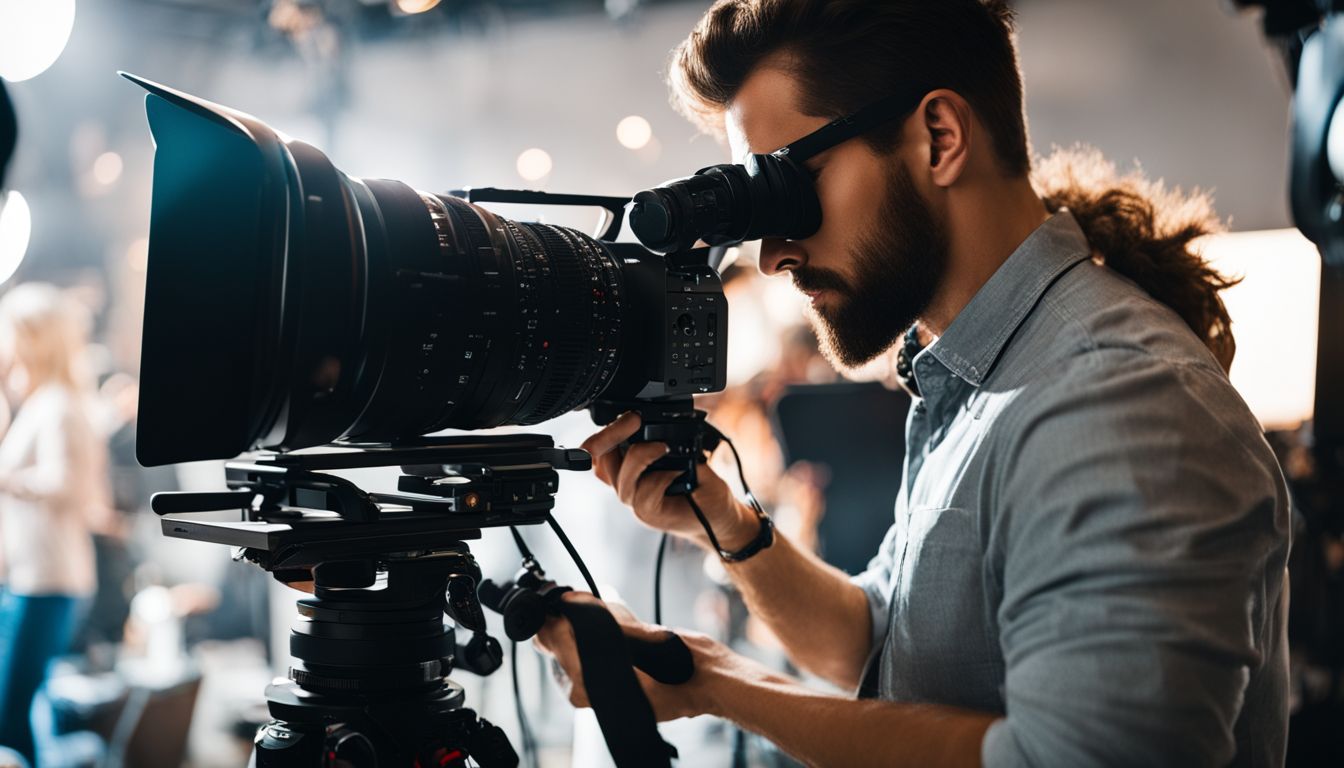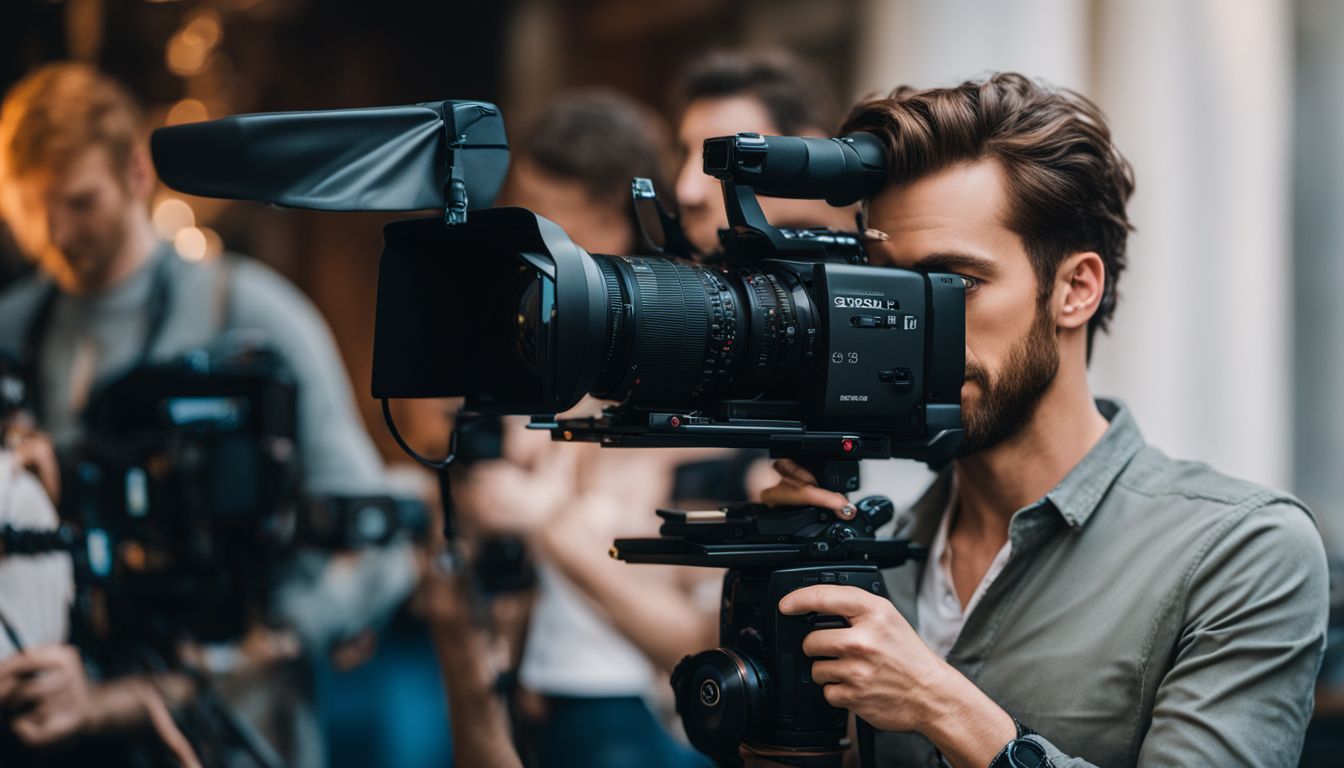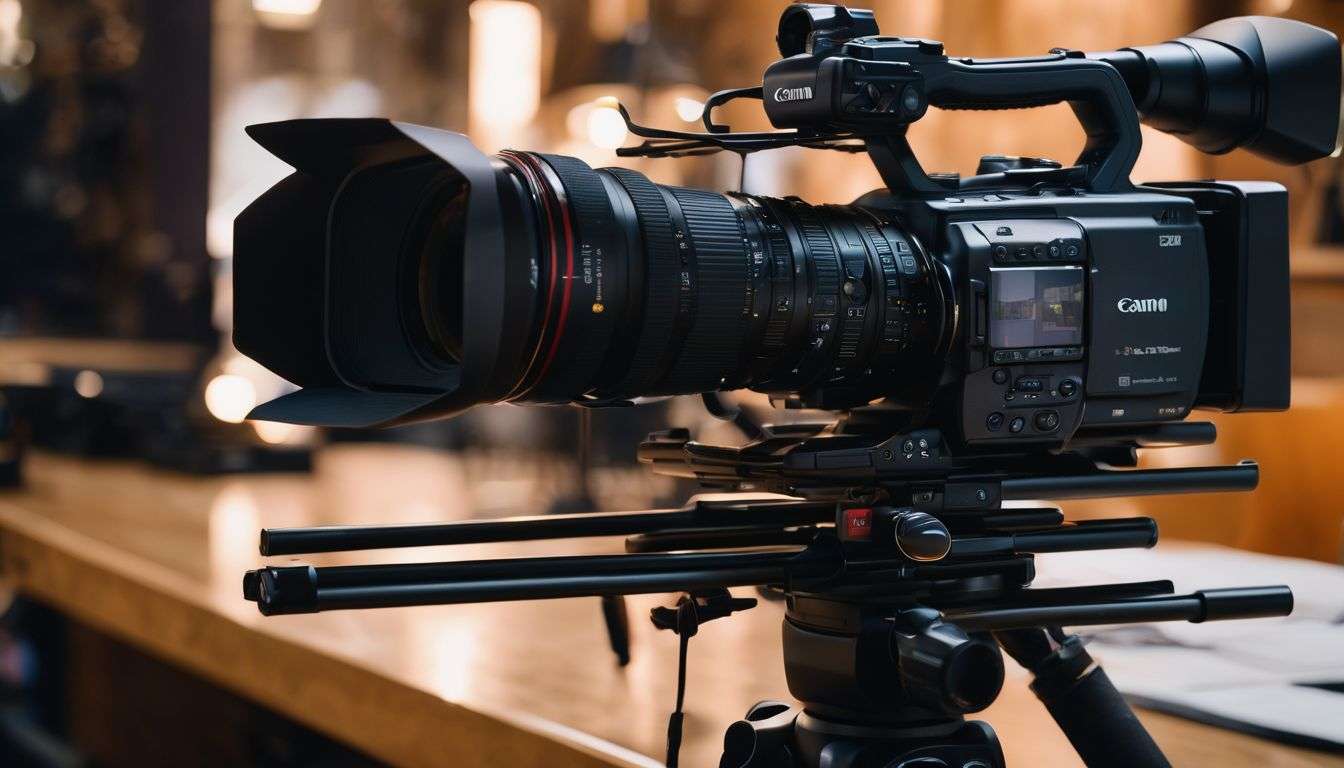Ever fancied turning your passion for visual storytelling into a full-fledged career in videography? You’re certainly not alone – it’s an appealing industry with the added bonus of being rather lucrative.
Equipped with extensive research and first-hand experience, we’ve collated crucial factors contributing to becoming a successful videographer. Traverse through this article as we delve into necessary qualifications, essential skills, additional requirements and more – all designed to gear you up for the thrilling universe of professional videography!
Key Takeaways
- A videographer needs technical proficiency in video editing software like Adobe Premiere Pro and Final Cut Pro.
- Strong interpersonal and communication skills are important for working with clients and collaborating with team members.
- Pursuing a degree or vocational qualification in media production or photography can be beneficial, along with gaining practical experience through internships or freelance work.
Understanding the Role of a Videographer

A videographer is responsible for capturing and recording footage for various purposes, such as films, commercials, documentaries, or events. This requires them to have a deep understanding of camera equipment, lighting techniques, shot composition, and audio recording.
Additionally, they must possess strong storytelling skills to effectively convey the desired message through visual means.
What Does a Videographer Do??
A videographer uses a camera to record events. They shoot videos of weddings, birthdays, and meetings. If they work for a company, they might film ads or training videos. After filming, they use computer software to edit the video.
This makes the video look great before it is shown to people. Along with filming and editing, videographers need good people skills too! Sometimes, they direct actors in the scene or talk with clients about their needs.
So you see, being a videographer means doing different things each day but always working towards making great videos!
Job description and responsibilities
Videographers have key tasks they do in their job. These are:
- They capture video footage. To do this, they use various camera equipment.
- It is their duty to set up and take down filming gear. This can include cameras, tripods and lighting tools.
- A videographer plans the filming. This involves picking locations and deciding on the camera shots.
- During filming, they must pay close attention to sound levels and light conditions.
- Videographers also edit the footage after shooting it. They use computer editing software for this task.
- Finally, they are also in charge of keeping all video files safe and organised.
Duties and tasks of a videographer
Being a videographer isn’t just about shooting videos. It involves a lot of tasks and duties that need to be done well.
- Making the video plan: Before hitting record, we have to make a plan for what the video will look like. This includes picking the shots and deciding how they will go together.
- Shooting the footage: This is where we use our camera skills to take great shots.
- Editing the video: Once we have all our footage, it’s time to put it all together. We use editing software for this part.
- Working with team members: We often work with others on our jobs. Good teamwork helps get things done fast and makes sure everyone is happy with the finished video.
- Taking care of camera gear: Like any worker, we need to keep our tools in good shape! For us, this means taking care of our cameras and other equipment.
- Meeting with clients: Most of our jobs come from clients who want videos made for them. We need to meet with them to find out what they want, then deliver a video that makes them happy.
- Keeping up with new trends: The world of videography changes quickly! We need to keep up-to-date so we can make the best videos possible.
Essential Skills and Qualifications for Videographers

To be successful as a videographer, it is essential to have technical proficiency in video editing software and strong interpersonal and communication skills.
Technical proficiency in video editing software
Knowing how to use video editing software is key for a videographer. Programs like Adobe Premiere Pro and Final Cut Pro are tools we often use. These let us cut, trim, and arrange clips in the right order.
We can also add effects, titles, and sounds with them. The better we are at using these programs, the better our videos will turn out! It’s important for us to keep learning new things about these tools too.
That way, we stay on top of any changes or updates they might have. Plus, it lets us try new ways of making our videos look great!
Strong interpersonal and communication skills
Good people skills are a must for videographers. They work closely with clients and subjects all the time. Interpersonal skills help us build strong relationships with those around us.
These skills also make it easier to understand other people’s needs.
Communication is key in videography, too. Videographers have to share ideas and plans with others on their team. Good speakings kills mean we can get our points across clearly and quickly so everyone knows what they need to do.
Plus, when issues pop up, good communication helps solve them fast.
Creativity and attention to detail
Being a videographer is an art. We need to think of new ideas and have an eye for detail. It’s not just about shooting video. We use creativity to tell a story with the footage we capture.
Details matter in our work; we notice everything from light, shade, colors, to angles. Good work comes from paying attention and using our artistic side at all times.
For example, you could shoot two videos of the same place but make them look totally different. How? By trying out new things and focusing on unique details! That’s why creativity matters so much in our job.
Plus, clients love it when we bring fresh ideas to their projects.
Attention to detail also plays a big role here. If something looks off in the shot or if there’s a glitch in the editing process, it can ruin the entire project! We always keep our eyes wide open for these little issues that many may overlook.
Educational Requirements and Training
To become a videographer, it is beneficial to pursue a degree or vocational qualification in media production or photography. Gain practical experience through internships or freelance work to enhance your skills and knowledge.
Read more about the educational requirements and training needed for a successful career in videography.
Pursuing a degree or vocational qualification in media production or photography
Going to school for media production or photography is very helpful. You learn a lot about camera work and video editing. These skills are key in videography. Classes will teach you about the latest tools and tricks of the trade.
This makes your work even better! While studying, you can also try doing internships. This gives you real-world experience. Interning lets you find out what parts of the job you like most, too!
Gaining practical experience through internships or freelance work
To gain practical experience in videography, you can consider the following options:
- Seek internships at media production companies or studios.
- Offer your services as a freelance videographer for small projects or events.
- Collaborate with local businesses or organizations to create promotional videos.
- Join online communities or forums to find opportunities for collaboration or mentorship.
- Participate in workshops, seminars, or training programs related to videography.
Additional Requirements and Advantages
In addition to technical skills and creativity, videographers should also have knowledge of industry trends and equipment, physical stamina for on-site filming, and an understanding of legal and copyright regulations.
Discover more about the requirements for a videographer in our latest blog post!
Knowledge of industry trends and equipment
Being aware of the latest industry trends and having knowledge about videography equipment is crucial for a videographer. Staying up-to-date with evolving technologies and techniques can help them produce high-quality videos that meet client expectations.
By keeping an eye on industry trends, videographers can incorporate innovative ideas into their work and stay competitive in the market. Additionally, having a good understanding of different types of cameras, lighting equipment, and editing software is essential to create professional-looking videos.
A videographer who knows how to use the latest tools and equipment effectively will be able to deliver exceptional results for their clients.
Physical stamina and mobility for on-site filming
Videographers need to have physical stamina and mobility for on-site filming. This means they must be able to handle the physical demands of carrying camera equipment, setting up lighting, and moving around different locations.
They may need to stand or walk for long periods of time while capturing footage. Additionally, videographers often work in various settings, such as outdoor environments or tight spaces, so being physically agile is important.
Good endurance and flexibility are key traits for videographers to ensure they can effectively capture the footage needed for a project without any limitations due to their physical abilities.
Understanding of legal and copyright regulations
As videographers, we must have a good understanding of legal and copyright regulations. This means knowing the rights and permissions associated with using music, images, and other copyrighted materials in our videos.
We need to make sure that we obtain proper licenses or use royalty-free content to avoid any legal issues. Additionally, being aware of privacy laws is crucial when filming people or capturing footage in public places.
By respecting these regulations, we can ensure that our videos are legally sound and protect ourselves from potential lawsuits or infringements on others’ rights.
Conclusion
In conclusion, becoming a videographer requires a combination of technical skills and creative abilities. Excellent computer literacy and proficiency with editing software are essential.
Good interpersonal skills are also important for working with clients and subjects. While a bachelor’s degree is common, gaining practical experience through internships or freelance work can be valuable in this field.
With the right qualifications and expertise, you can pursue a rewarding career as a videographer.
What Skills Are Typically Required for a Videographer?
When pursuing a career in videography, certain essential videographer skills are typically required. These include a strong eye for capturing shots and framing compositions, proficiency in operating cameras and editing software, knowledge of lighting techniques, and effective communication and teamwork abilities. Furthermore, attention to detail, creativity, problem-solving aptitude, and the ability to work under pressure are highly valuable attributes for a videographer.
What Skills and Experience Do I Need to Become a Videographer?
To excel in videographer roles and responsibilities, one needs a combination of technical skills and experience. Proficiency in operating video cameras, understanding composition and lighting, and editing footage is crucial. Additionally, having a creative eye, the ability to communicate effectively, and staying updated with industry trends are important for a successful career in videography.
What Type of Lenses Are Necessary for a Videographer?
Understanding videography lenses is crucial for every videographer. Whether shooting weddings, commercials, or documentaries, different lenses serve different purposes. Wide-angle lenses capture sweeping landscapes, while telephoto lenses zoom in on distant objects. Prime lenses offer great image quality, while zoom lenses provide versatility. Ultimately, videographers should have a selection of lenses to capture various shots and convey their vision effectively.
FAQs
1. What qualifications do I need to become a videographer?
There are no specific qualifications required to become a videographer, but having a degree or certification in film production or a related field can be beneficial.
2. Do I need expensive equipment to be a videographer?
No, you don’t need expensive equipment to start as a videographer. Basic camera gear and editing software will suffice, and you can invest in more advanced equipment as you progress.
3. Can I learn videography on my own?
Yes, many successful videographers are self-taught. There are numerous online resources, tutorials, and courses available that can help you improve your skills.
4. Is experience necessary to work as a professional videographer?
While experience is not always mandatory, it greatly enhances your chances of finding work as a professional videographer. Building up your portfolio through personal projects or freelancing is valuable.
5. Are there any specific skills required for being a successful videographer?
Some essential skills for being a successful videographer include storytelling, composition, camera operation, video editing knowledge, creativity, and good communication with clients or team members.






